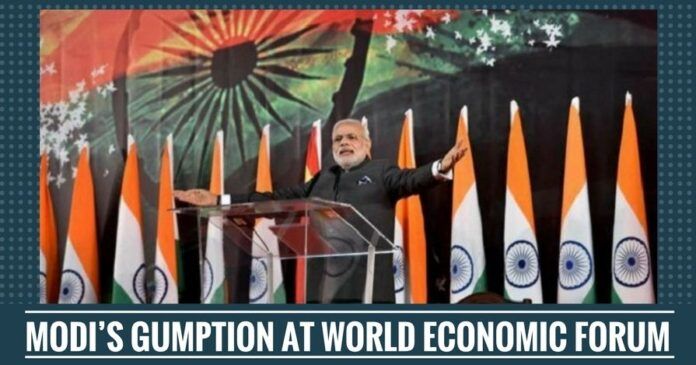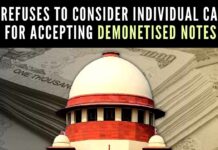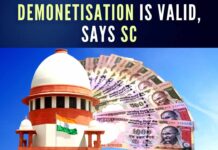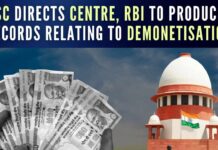
Whatever one may say about Prime Minister Narendra Modi, one can’t accuse him of lacking gumption
Prime Minister Narendra Modi’s gumption was on full display at the plenary session of the 48th World Economic Forum (WEF) in Davos, Switzerland. At a time when hooligans at home were violently protesting against Padmavat, succeeding in suppressing freedom of expression, and trampling that pillar of civilization, the rule of law, Modi was singing paeans to democracy. And while the quixotic policies were tormenting businesspersons across sectors, he was waxing eloquent about openness and predictability of policies.
“You might have seen in the recent past that more than 1.25 billion Indians accepted in one voice and moved towards a less cash society and a unified tax system in the form of GST,” he said. “These two historic decisions happened one after the other and in less than a year’s time. We are now a financial system which is fully prepared and integrated for digital transactions. All this has fulfilled our dream and your desire of India as one nation, one tax. It has also started a fresh journey towards a modern tax regime that is transparent, stable, and predictable.”
GST officers ordered hundreds of companies—including Google India, Panasonic, and Suzuki Motorcycles—to provide extensive documentation within hours.
It is a bit rich on the part of the Prime Minister to assume that everybody in the country “accepted in one voice” his unilateral decision about demonetization, along with the Gauche implementation of the goods & services tax. The GST regime is still work in progress and is troubling entrepreneurs, but he calls it “transparent, stable, and predictable.”
At Davos, Modi lauded his own government for the predictability of its policies. This must have sounded like a cruel joke to industry, for there is nothing they or anybody else could be sure about as far as economic policy is concerned. At the stroke of a pen, the Prime Minister invalidates 86 percent of the currency, completely disregarding the imperatives of an economy, thus inflicting unprecedented misery on millions of people, ruining the informal sector, and killing countless jobs. Everybody is caught unawares, and now he is talking about predictability.
His ministers follow suit. In September last year, the Railways Ministry unilaterally changed the terms of contract with General Electric. Instead of diesel engines, it was supposed to switch to making electric ones. The $2.6-billion contract for the supply of 1,000 diesel locomotives was in jeopardy. It was only after the American firm’s protest and widespread condemnation of the Railways’ sudden policy change that the government relented. A few weeks before that, Road Transport Minister Nitin Gadkari had threatened to “bulldoze” the auto sector. The tirade again was against diesel and petrol vehicles.
Unsurprisingly, taxmen chalk out rules and regulations that businessmen find cumbersome and onerous.
On January 5, GST officers ordered hundreds of companies—including Google India, Panasonic, and Suzuki Motorcycles—to provide extensive documentation within hours. In general, taxmen have almost carried out a coup, arrogating huge powers to themselves, thanks to the cluelessness of Finance Minister Arun Jaitley. With the Prime Minister busy in events, Jaitley interested in matters other than economic, and revenue maximization becoming the primary goal of the Finance Ministry, this was inevitable.
Unsurprisingly, taxmen chalk out rules and regulations that businessmen find cumbersome and onerous; compliances multiply all the time. Against this backdrop, Modi invites investors to India.
In this context, it would be worth quoting Margaret Mitchell, the author of Gone With the Wind: “If Gone With the Wind has a theme, it is that of survival. What makes some people come through catastrophes and others, apparently just as able, strong, and brave, go under? It happens in every upheaval. Some people survive; others don’t. What qualities are in those who fight their way through triumphantly that are lacking in those that go under? I only know that survivors used to call that quality ‘gumption.’ So I wrote about people who had gumption and people who didn’t.”
Indeed Modi has tons of gumption, so he may survive and even thrive. But it takes more than the gumption of one man, howsoever important he may be, to revive an economy.
Note:
1. The views expressed here are those of the author and do not necessarily represent or reflect the views of PGurus.
- Liberty Is Penalized, Violence Goes Untouched - December 21, 2019
- Rahul’s Howdy bloomer - September 22, 2019
- Chidambaram’s hypocrisy - August 22, 2019











There are people other than Shashi Tharoor who force you to refer to a dictionary thrice, while reading one sentence. In that process, a reader is distracted off the content of the article, if there was any at first place. In a country, where English is not a language but a demonstration of intellect, the authors in their own perception become intellects. Just camouflaging in a flowery language does not make the content sound!
PGurus shouldn’t take it upon itself the task of berating Indian Economic policies. GST is here to stay and is broadening the tax net. is also trusting the business community to collect and deposit the tax revenue to the Government, collected as GST.
if one makes a purchase from Amazon or the likes, and looks at the invoice, before n after GST, one would not fail to notice that whereas earlier the invoice used to give details of items, tax collected etc, post GST, they were not at all clarifying.
so if the taxmen wanted them to clarify, they should have.they should have declared that the prices indicated r cost plus GST, and then bill make the invoices accordingly.
the Author has showed his prejudice and immaturity in this article. PGurus shouldn’t promote such pen-quackery here, use of terms like Gumption should b avoided, for our tallest leader, who has inherited an India, that was 10th largest economy and which has taken it to the position of 5th in just 3 years.
If Mr. R.S.Kapoor has any claim to being the sole repository of all knowledge of wisdom, then it is an occasion to pity him. Indian economy is in safe hands, although, i too, feel that Dr.S.Swamy would have been a better FMI.
Why even PMs previous to him have forcefully articulated our view point. There is nothing new in it.
It was especially difficult when India was a fledgling Democracy and a poor nation to boot and all the
Western Powers were ranged against us. Now the situation is totally different. We have now become a
strong NATION and therefore the gumption.